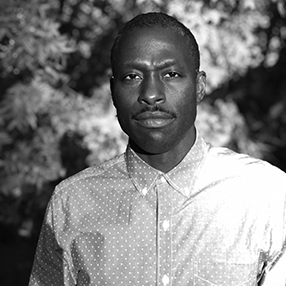Tag at Pullman National Monument
The market is made of fire so nothing
Stands, or stands—even in the ideal
City of Pullman, I hear “nigga run,”
One child shouting to another in ruins,
Of ruin and so call out in paradise
To the live bloody skeleton hung softly
As summer in each other to escape
This year’s killing season, the pilgrimage
To flame and morgue and news and dust, local
Honey sold nationally, the market
Always-already wet with this black fame.
In an alley beyond their beware and boy-
Barking, a painting of a Maasai warrior
Lifting himself out of the frame with a leap,
His spear, nothing like fire but a fire
The leaping, the leaving of the coffin-
Pull of earth, his red garment about him
In clasped silence for which we understand
That we will not understand and so stare
At something else trying to escape
Paradise. Beauty has always belonged
To whomever could afford it. None of us
Can afford what we pay for beauty, but
We labor, we labor, our white rag wet
With formaldehyde, our knees deep in shag
Carpet pressing a stain as commanded
By a mastering manual kept in a slim slash
Pocket, our white charges sleeping their way
Across cud-chewing to Chicago
Dreaming of a man they watched burn this tree-side
Of heaven. “Run nigga,” the boys yell
As if hocking oranges in a burning market,
As if what they flee is not each other.
Copyright © 2016 by Roger Reeves. This poem was commissioned by the Academy of American Poets and funded by a National Endowment for the Arts Imagine Your Parks grant.
"Utopias don’t last long if they last at all. The poem begins with a building that can do nothing but burn throughout the twentieth century in a utopic community built by the railroad magnate, George Pullman, for his workers, a community that very few people of color lived in until recently. While visiting the National Park of Pullman, my ear was pulled toward the boys playing tag, weaving in and out of yards and parked cars, yelling ‘run, nigga.’ The boys yelling ‘run, nigga’ seemed like both a warning and celebration, particularly in a city like Chicago where this type of entreaty could be both threat and jubilee. Though the boys were playing in the alleyways and streets, shouting back and forth to each other, because of the sirens nearby, their play was always circumscribed or, at the very least, in conversation with the violence that consumes the national news and the reigning narrative about Chicago. I couldn’t help but write into and about these juxtapositions and contradictions."
—Roger Reeves

